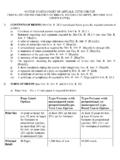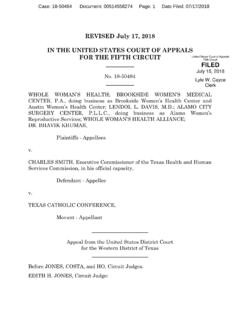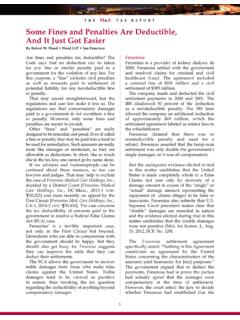Transcription of United States Court of Appeals Fifth Circuit FILED Revised ...
1 * District Judge for the Western District of Louisiana,sitting by States Court of AppealsFifth Circuit FILEDN ovember 20, 2003 Charles R. Fulbruge IIIC lerkRevised December 10, 2003IN THE United States Court OF APPEALSFOR THE Fifth CIRCUIT_____No. 03-60010_____DIJO, ,versus HILTON HOTELS CORP., PARK PLACE ENTERTAINMENT CORP.; THE GRANDCASINO, INC.; BL DEVELOPMENT CORP.; and BL RESORTS I from the United States District Courtfor the Northern District of Mississippi_____Before JOLLY and WIENER, Circuit Judges, and WALTER, DistrictJudge.
2 *WIENER, Circuit Judge:After a trial in which the jury found for the Plaintiff-Appellee DIJO, Inc. and awarded it $8 million in damages, theDefendants-Appellants appeal, alleging numerous errors thatpurportedly occurred in the district Court . For the reasonsexplained below, we affirm the judgment on the jury s finding ofliability but remand for a new trial on the issue of BACKGROUND FACTSDIJO, Inc. ( DIJO ) is a two-person company formed by JoBursley, a mortgage broker involved with developing hotelproperties, and Jay Turner, a veteran developer of large, complexcommercial real estate ventures.
3 The Defendants are Grand Casinos,Inc. ( Grand ), two subsidiaries , BL Development Corp. and BLResorts I, ( BLR ), Hilton Hotels, Corp. ( Hilton ) and ParkPlace Entertainment ( Park Place ).Early in June, 1998, Grand s subsidiary, BLR, granted a forty-nine year ground lease (the Lease ) to DIJO covering land nearGrand s casino in Tunica, Mississippi (the property ). DIJO leased the property from BLR for the purpose of developing andconstructing a Comfort Suites Hotel (the Project or the hotel )whose guests would primarily be Grand s casino patrons.
4 The Leaseprovided that DIJO would pay rent based primarily on the hotel sgross than one month after the Lease was executed, Grand andHilton announced that, effective December 31, 1998, Grand s non-Indian gaming interests and Hilton s gaming interests would becontributed to a newly-formed corporate entity, Park Place, whichwould be owned by Grand and Hilton. This transaction was theproduct of confidential discussions between the companies which hadcommenced as early as fall 1997. Even so, Hilton did not learn ofthe Lease until after the Park Place formation was after that announcement, putative executives of the soon-to-be-formed Park Place began reviewing Grand s capitalexpenditures and decided that they were not interested in havingDIJO s hotel on the property.
5 As a result, Grand offered topurchase DIJO s interest in the initiating buyout negotiations with DIJO, Grand professedto be ready, willing and able to proceed with the deal, butnevertheless advised DIJO that the Project was no longer in ParkPlace s best interest. Consequently, Grand wanted to reach anagreement with DIJO to cancel the Lease and asked DIJO for a buyoutfigure. While discussions of the potential buyout were proceeding,the Project was placed on hold. After DIJO submitted an offer tosell its interest in the Lease for $ million, however, Grandapparently reversed course, informing DIJO that proceeding with theProject as originally planned would be in Grand s best advised DIJO that Grand would issue an amendment to thelease to allow for the additional time to commence construction asa consequence of the delay caused by the intervening to DIJO, though, irreparable damage had already beendone.
6 DIJO notified Grand that Grand s conduct cast a cloud overthe project making it unsalvageable. DIJO asserted further thatGrand s adverse positions constituted a breach of the Lease,jeopardizing the Project and causing DIJO substantial damage. The1 Coffel v. Stryker Corp., 284 625, 630 (5th Cir. 2002).2 Doddy v. Oxy USA, Inc., 101 448, 459 (5th Cir. 1996).4parties subsequent negotiations failed, and this litigationfollowed. The district Court entered judgment on the basis of thejury s verdict, and the Defendants timely FILED their notice OF REVIEWThe Defendants argue that the district Court wrongly deniedtheir motions for summary judgment, directed verdict, and newtrial.
7 In effect, they appeal the district Court s denial ofjudgment as a matter of law. As such a challenge contests thesufficiency of the evidence to support the jury s verdict, weexercise de novo The Defendants also appeal severalevidentiary rulings. A district Court s evidentiary ruling willnot be reversed absent a clear abuse of Ourapplication of these standards is explained more fully of DIJO s liability claims went to trial. One was DIJO sclaim for breach of contract asserted against all Defendants exceptHilton.
8 The essence of this claim is that, through thecircumstances surrounding the buyout offer and the ambiguous3 The parties disputed precisely what it meant that theProject was put on hold. DIJO argued that putting the Project on hold was tantamount to cancelling the Project completely. TheDefendants contended, on the other hand, that only the deadlines inthe Project timetable were abated pending buyout Nowell By and Through Nowell v. Universal Elec. Co., 1310, 1312 (5th Cir. 1986).
9 5decision to put the Project on hold,3 the Defendants made itimpossible for DIJO to perform under the Lease. Therefore, DIJO asserted that despite their ostensible willingness to carry onwith the Project the non-Hilton Defendants effectivelyrepudiated the Lease through their conduct. Second, DIJO brought a claim against Hilton for tortiousinterference with the Lease. DIJO charged that Hilton inducedGrand to breach the Lease because Hilton did not want acompetitor s hotel near the Tunica casino in which Hilton had appeal, the Defendants challenge the sufficiency ofevidence supporting the verdict against them on DIJO s claim forbreach of contract.
10 The Defendants also complain that the districtcourt should not have allowed the jury to consider DIJO s tortiousinterference claim against Hilton. Because the jury returned ageneral verdict for DIJO, however, it is impossible to tell whetherthe jury found for DIJO on one or both of its causes of action. Wemust, therefore, analyze each liability theory to determine whetherit is sustained by the evidence and is legally of Contract Claim: Sufficiency of the Evidence5 Coffel, 284 at See The jury instruction on breach of contract stated: Unlessyou find that these Defendants refused or made it impossible forDIJO, Inc.

















